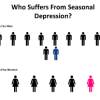- Empty cart.
- Continue Shopping
How to Recognize Early Signs of Macular Degeneration

Macular degeneration is a progressive eye condition that primarily affects older adults, leading to a loss of central vision. Early detection is crucial for managing the condition and slowing its progression.
Early Symptoms to Watch For
One of the first signs of macular degeneration is a gradual or sudden change in the quality of your vision. You may notice that straight lines appear wavy or distorted. This is often most evident when looking at things like door frames, window blinds, or even the edges of a book.
Another early symptom is difficulty adapting to low light levels, such as when entering a dimly lit room. You may find that you need more light than usual for reading or other close-up activities. Additionally, you might experience a blurry or blind spot in the center of your visual field, which can make tasks like reading or recognizing faces challenging.
Risk Factors to Consider
Several risk factors can increase the likelihood of developing macular degeneration. Age is the most significant factor, with individuals over 60 being at higher risk. Other risk factors include smoking, a family history of the condition, and prolonged exposure to ultraviolet (UV) light.
If you have any of these risk factors, it’s especially important to be vigilant about monitoring any changes in your vision and to have regular eye exams. Early detection can make a significant difference in the management of the condition.
The Importance of Regular Eye Exams
Regular eye exams are crucial for detecting macular degeneration in its early stages. During a comprehensive eye exam, an ophthalmologist will perform tests to evaluate your central vision and may also take special images of the retina to look for signs of the condition.
The American Academy of Ophthalmology recommends that adults with no signs or risk factors for eye disease get a baseline eye disease screening at age 40. For those with risk factors or existing eye issues, more frequent exams may be necessary.
What to Do if You Notice Symptoms
If you observe any of the early signs of macular degeneration, it’s essential to consult an eye care professional as soon as possible for a comprehensive eye exam. If diagnosed early, treatments such as laser therapy, medications, or even lifestyle changes like improved diet and quitting smoking can help slow the progression of the disease.
Recognizing the early signs of macular degeneration is crucial for timely intervention and management. Symptoms like distorted vision, difficulty adapting to low light, and central vision loss should not be ignored. Risk factors like age, smoking, and family history make regular eye exams even more critical.
If you notice any changes in your vision, consult an eye care professional for a comprehensive evaluation. Early detection and treatment can significantly impact the progression of macular degeneration, helping you maintain better vision for a longer period.








